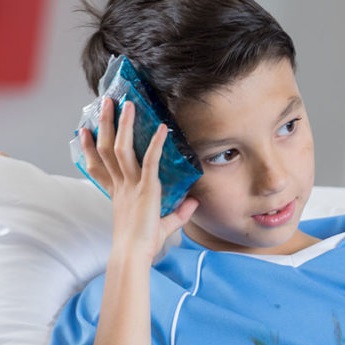What Makes a Child Tic?

January 18, 2019
Frequent eye blinking, facial grimacing, shoulder shrugging, sniffling, repetitive throat clearing or uncontrolled vocalization – these are all symptoms of a tic. For a parent, seeing or hearing your child exhibit these unexpected movements or sounds can be extremely worrisome.
There are likely a ton of questions going through your head: Is my child having a seizure? What is causing this? Should I take them to the doctor? Will they have this tic forever?
These questions are completely normal. In fact, pediatric neurologist, Marina Khrizman, D.O. of K. Hovnanian Children’s Hospital, informs that you are not alone in your concerns. “Tics are incredibly common, as many as one in five children have a tic during their school years, and most tics go away on their own in less than a year, usually even shorter,” shares Dr. Khrizman.
Dr. Khrizman provided some of the most common questions parents ask surrounding their child’s tic.
What exactly is a tic?
“Tics are sudden, brief, stereotyped motor movements or vocalizations. Although they are involuntary, children will report what’s called a premonitory ‘urge’ to do the tic, and will feel a release of tension once it is done,” says Dr. Khrizman.
“If the child is able to concentrate on the movement, they may be able to suppress it for a short period of time; however it will have to be released later on. This is why many parents will see these movements after they pick their child up from school,” notes Dr. Khrizman.
Are tics related to Tourette syndrome?
“Most tics will go away on their own – tics that go away in less than a year are known as transient tics, meaning they are only temporary. When a patient has both vocal tics and motor tics for more than a year, that’s identified as Tourette syndrome,” mentions Dr. Khrizman.
What causes a tic? Are there any preventative measures?
“Unfortunately, there is no way to prevent a tic,” Dr. Khrizman says. “Tics typically start to appear around 5 to 10 years of age, and we don’t fully understand the cause. However, it’s believed that there are neurochemical changes in the neurons that produce dopamine and serotonin, impacting several parts of the brain including the thalamus, cerebral cortex and striatum.”
How can I help my child manage his or her tics?
“The best way to manage a tic is to ignore it – more often than not, families are more bothered by the tic than the child themselves,” advises Dr. Khrizman. “When you draw attention to the tic, it can exacerbate the child’s anxiety, and anxiety can make tics worse.”
Dr. Khrizman recommends trying breathing exercises with the child to help reduce anxiety or stress.
Parents should also be aware of the emotional impact this may have on a child’s self-esteem. It’s important to make sure the child feels supported through this, particularly when they are of schooling age. Reassure them that everything is okay, and that there is no need to be self-conscious.
When should I consult a doctor?
Dr. Khrizman advises that parents should always bring up their concerns to their pediatrician, who can further evaluate to determine if the symptom is a tic or something different.
“Tics are usually diagnosed based on the symptoms the parent or the child describes, and a pediatrician will generally be able to identify a tic – usually, no other tests are necessary,” mentions Dr. Khrizman. “If the diagnosis is not clear, the tics start to bother the child, cause pain or significant disruption in learning, we recommend the child be evaluated by a neurologist. Also, if there are any other abnormal movements or concerns on the neurological examination, this is also definitely a reason for further investigation with a neurologist.”
Attention deficit hyperactivity disorder (ADHD), anxiety and obsessive compulsive disorder (OCD) can occur in children who have tics, and specifically those who have Tourette syndrome. “A doctor should certainly be involved at that point because treating those disorders is as important, if not more important, than treating the tics themselves,” shares Dr. Khrizman.
What treatment options are available for my child?
Most of the time, treatment is not necessary. Effective behavioral based and medication options do exist. “We really only consider treatment if the tic is disrupting daily activities, such as causing pain or learning difficulties” says Dr. Khrizman.
“There is a type of therapy called habit reversal therapy which teaches the child how to address the tics. This essentially trains the child to perform a competing response, which can eventually offset the tic movement,” adds Dr. Khrizman.
Next Steps & Resources:
- Meet our clinical contributor: Marina Khrizman, D.O.
- To make an appointment with Dr. Khrizman or a doctor near you, call 800-822-8905 or visit our website.
Sources:
- Kurlan et al., 2001. Kurlan R., McDermott M.P., Deeley C., Como P.G., Brower C., Eapen S., et al: Prevalence of tics in schoolchildren and association with placement in special education. Neurology 2001; 57: pp. 1383-1388
- Centers for Disease Control and Prevention (CDC)
- National Institute of Neurological Disorders and Stroke (NIH)
- NJ Center for Tourette Syndrome (NJCTS)
The material provided through HealthU is intended to be used as general information only and should not replace the advice of your physician. Always consult your physician for individual care.
Find a doctor near me
Signs Your Child Is Having a Seizure

Recognize child seizure signs? Learn how to help from Dr. Tomycz, Joseph M. Sanzari Children's Hospital. Get expert advice now.
COVID Vaccine and Children: What to Know

Here's everything parents need to know about the COVID vaccine.
Find a doctor near me

How COVID-19 Affects Kids Long Term
Learn how COVID-19 impacts children long-term. Discover post-COVID symptoms & find support for your child's recovery. Get expert pediatric care now.

Meningitis: Know the Early Signs in Kids
Recognize meningitis symptoms in kids? Dr. Sultan shares early warning signs. Learn more and find pediatric neurology care. Call 800-822-8905.

Unsure it's a Concussion? Here Are 5 Signs You Should Seek Care for Your Child
It’s not always easy to know if someone has a concussion. Movies and pop culture sometimes portray the scene much more dramatically than what happens in real life.

Can Melatonin Gummies Help Kids Sleep?
Help your child sleep better. Learn about melatonin gummies for kids from pediatric sleep specialists. Get advice & improve bedtime habits.
